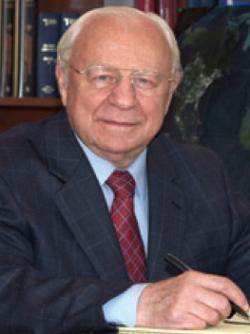Margaret Thatcher: Her Life And Legacy
Margaret Thatcher, the first woman to serve as Prime Minister of Britain, became a worldwide phenomenon—a symbol of national revival and restored values. Perhaps only Winston Churchill—Britain’s World War II leader against Nazi tyranny—bears comparison. Many came to love and respect what they accomplished and both were patriots who came to the fore at crucial times.With her death in April, at age 87, many are considering her legacy to Britain and the other English-speaking nations.
Rising from humble roots in the East Midlands of rural England, “Maggie” became Conservative Party leader in 1975, and led her government for 11½ years (1979–1990). In her time as Prime Minister, she became a towering figure on the world stage and contributed to the collapse of communism and the Soviet Union. Her principles gave rise to what became known as “Thatcherism”—a set of beliefs focused on individual freedom, “responsible individualism,” light regulation and a minimum of taxation and government spending.
By all accounts, Baroness Thatcher (she earned the title in 1992 with the awarding of a peerage in recognition of her lifetime of service) was blessed with formidable assets of intellect, energy, strength of personality and character. Though she was a controversial, even divisive figure, she will likely be remembered as one of Britain’s greatest peacetime leaders.
What was the secret of her success? Why did she stir such powerful hatred in the hearts of those who were opposed her policies? And can we relate her leadership to the message of the Bible?
Her Struggle
It is a truism that “strong opinions divide.” Thatcher’s opinions were, in political terms, right-wing Conservative values. But, more than that, she had imbibed strong religious and social principles from her Methodist upbringing, which colored everything she stood for. Her father was a lay preacher, whose stirring sermons provided a steady diet of character-building principles to a daughter eager to learn and progress. Hard work, thrift, personal responsibility and service, loyalty to one’s principles—all these very practical moral virtues combined to create Thatcher’s unbending strength. A passionate belief in the moral principles of the Bible, love of country and a ferocious drive to accomplish drove Thatcher inexorably on.
In the years before she became Prime Minister, successive administrations—both Labour and Conservative—had failed to solve Britain’s problems. Powerful labor unions ruled the roost, unleashing unprecedented numbers of strikes that had all but paralyzed British society. A “winter of discontent” in 1978–79 had seen uncollected garbage strewn in the streets. Inflation was rampant and debts were so large that they required a humbling bailout by the International Monetary Fund. Nothing seemed to be working. In many respects, Britain was a broken nation—deeply divided and falling apart. The nation had become the “Sick Man of Europe” and desperately needed a dose of sound medicine!
Not for Turning
Into this grand mess strode a determined woman. Having forensically analyzed what she saw as the basic causes of the malaise—socialism in all its guises—an incensed Thatcher decisively intervened. She declared her policies boldly, with the famous line, “The lady’s not for turning!” Standing firm, she and her supporters led a dramatic turnaround of moribund Britain. It was a hard, unyielding and uphill struggle, and many bitterly resented the loss of unaffordable socialist comforts—but through her determination Thatcher transformed the nation economically, politically and socially, reviving Britain’s standing in the world.
The Thatcher revolution was nothing short of a moral crusade. She set out to radically alter the national mentality from despair and imminent collapse to one of success and prosperity. She declared in 1981, “Economics are the method; the object is to change the soul.” And she was in no doubt as to the heart of that revolution: “I find it difficult to imagine that anything other than Christianity is likely to resupply most people in the West with the virtues necessary to remoralise society in the very practical ways which the solution of many present problems requires” (The Path to Power, p. 554).
Of course, for those who did not share Thatcher’s biblical outlook, her ideas and principles were nothing short of anathema. It comes as no surprise to learn that the political left—and most intellectuals, both within and without her own political party—detested what she stood for. Yet, more often than not, the average person in the street—on whose behalf her popular capitalism was directed—was in favor of her policies.
Spiritual Heritage
Christian principles, when implemented in our secular world, have sadly always tended to provoke division. The reason is simple: today’s world is invariably wedded to profoundly un-Christian values that it does not want to relinquish. Even when the Messiah Himself commissioned His disciples to go forth to preach the gospel of His coming world-ruling Kingdom, He warned them that the road would not be easy. There would be opposition, persecution and rejection (Matthew 10:16–19, 22–23). People would hate what Christians stood for, and the gospel message would divide communities and even families (vv. 34–39).
When the Apostle Paul preached that same message in Asia Minor, he was even accused of “turning the world upside down” (Acts 17:6). Yet, from God’s point of view, the reality was the opposite—Paul was actually turning the world right side up!
Baroness Thatcher recognized that the revolution she began is one that must be fought and won in each and every generation. There will always be some who pull in the opposite direction. Successes for individual freedom and biblical values, when they are won, will invariably be hard-fought and fragile. Until Christ Himself comes to establish the Kingdom of God on the earth, all human attempts will be tenuous and incomplete.
Back in 1978, at a church in the City of London, Thatcher delivered a timeless warning about the delicate state of freedom. “Freedom will destroy itself if it is not exercised within some sort of moral framework, some body of shared beliefs, some spiritual heritage transmitted through the church, the family and the school. It will also destroy itself if it has no purpose” (The Path to Power, p. 555).
That framework is soon coming. Prophecy reveals that Jesus Christ will return to establish a world government that will be based on true biblical principles. But it will not be a mere “Thatcherite” government! It will be the literal Government of God—a benevolent kingdom that will unite all peoples within God’s moral framework—a framework that defines true freedom.






